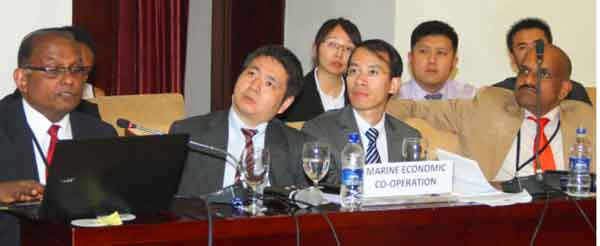21 Apr 2016 - {{hitsCtrl.values.hits}}

Tourism Consultant Srilal Miththapala (left) speaking at the Maritime Economic Cooperation and Management Meeting held yesterday. Pic by Pradeep Dilrukshana
By Chandeepa Wettasinghe
Sri Lanka is currently not a destination for sustainable tourists despite industry efforts, but new investments into research and communication projects could help battle the adverse effects, a leading tourism consultant in the country said.
In the last departure survey conducted by the Sri Lanka Tourism Development Authority (SLTDA), 59 percent of tourists had said that the sun, sea and sand were their main reason for
visiting Sri Lanka.
“This shattered our dreams of ecotourism. So, coastal areas will play a big role in whatever way we develop tourism in the future,” Srilal Miththapala said at the Maritime Economic Cooperation and Management Meeting held yesterday.
He said that though the responsible hotels tend to preserve the public beaches nearby, the carrying capacities across a great portion of Western and Southern coasts had been exceeded.
This is despite the industry ramping up an eco-tourism drive during the past decade.
The problem is compounded as the sun, sea and sand is frequently used as a euphemism for sex and drug tourism.w
Miththapala added that the nearly 9,000 hotel rooms in existence around coastal areas would increase to 12,600 by 2018 under the directions of the national policies.
“Do we have any sense of carrying capacity? We have beautiful plans. The problems are not with the plans, but implementation,” he said.
He noted that the private sector should lobby the government to reconsider the four million tourist arrival target for Sri Lanka by 2020, as there are doubts whether such a number can be entertained within the borders.
Miththapala said that appropriate regulations should closely follow the market trends and should be administered without jurisdictional battles between the government agencies.
Further, with the dramatic rise of informal accommodation due to advances in social media and online bookings, areas such as Arugam Bay and Kalpitiya are virtually unregulated.
“I think there are lot of opportunities for investors. We need to set up a database of the informal sector to record what goes on with the turtle hatcheries, kite surfing, whale watching and water sports,” Miththapala said.
He noted that investors could also initiate pilot projects to develop marine areas and showcase them internationally.
“We also need awareness programmes because people here don’t know what’s going on, and also set up a marine information centre for tourists,” he added.
26 Nov 2024 6 hours ago
26 Nov 2024 7 hours ago
26 Nov 2024 8 hours ago
26 Nov 2024 9 hours ago
26 Nov 2024 9 hours ago